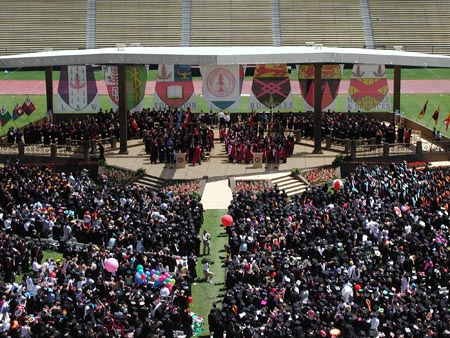Date
|
Topic
|
Guest
Lecturer(s)
|
Background
Material
|
Media
|
April 6
|
Course
Overview:
Questioning
Everything
|
|
|
|
April 13
|
Choosing
Courses
and
Majors
|
Cari Costanzo Kapur and Glenn
Brody Magid, Academic Directors, Undergraduate
Advising
and
Research
|
|
audio [.mp3]
|
April 20
|
Being
Well
|
Carole Pertofsky,
Vaden
Health
Center
|
|
audio
[.mp3]
|
April 27
|
Managing
Your
Time
|
Adina Glickman,
Center
for
Teaching
and
Learning
|
|
audio
[.mp3]
|
May 4
|
Getting
to
Know
Faculty
|
Clifford Nass,
Communication Department; and Mark
Musen, School of Medicine
|
|
audio
[.mp3]
|
May 11
|
Doing
Good
and
Doing
Well
|
Thomas
Schnaubelt, Haas Center for Public Service
|
|
Schnaubelt-slides
[.pdf]
Davies-slides [.pdf]
audio [.mp3]
|
May 18
|
Finding
Your
Identity
|
Tania
Mitchell, Center for Comparative Studies in Race and Ethnicity
Student panel:
* Roseann Cima ('11, Symbolic Systems)
* Michael Cruz ('12, History)
* Jordan Dickson ('12, Political Science)
* Ernst Fattakhov ('12, Biomechanical Engineering)
* Martin Padilla ('12, Biology)
* Emily Vogel ('11, Psychology)
|
- Stanford
University - Student Affairs
- SparkCollege:
Your
College
Identity
- Student development theory (aimed at student affairs
professionals and college educators):
- Student
development
theories [from Wikipedia]
- "Definitions
and
Historical
Roots of Student Development" [chapter 1 from Student Development in College: Theory,
Research, and Practice (2nd edition), by Nancy J. Evans,
Deanna S. Forney, Florence M. Guido, Lori D. Patton, and Kristen A.
Renn, 2009]
- "Emerging
Adulthood:
A
Theory of Development from the Late Teens Through the
Twenties" [by Jeffrey Jensen Arnett, The American Psychologist, May 2000]
- Course:
Student
Development
and the Study of College Impact (Educ 382)
- "A
Student
Development
Perspective at the University of California,
Berkeley"
- "Working
With
College
Students & Student Development Theory Primer"
[from University of North Carolina, Wilmington]
- Undergraduate Program in
Comparative Studies in Race and Ethnicity and Center for Comparative Studies in
Race and Ethnicity
- Stanford
Program in Feminist Studies
|
Davies-slides
[.pdf]
audio [.mp3]
|
May 25
|
Maintaining
Relationships
|
Alejandro Martinez, Counseling and
Psychological Services
|
|
Davies-slides
[.pdf]
audio [.mp3]
|
June 1
|
Stanford
-
Then What?!
|
David Evans, Stanford Design
Program
|
|
Evans-slides
[.pdf]
audio [.mp3]
|
